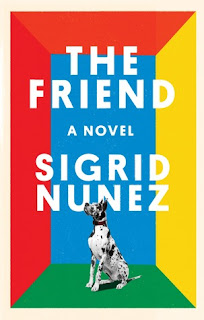And then I encountered Rilke, also quoted by Patricia Hampl in The Art of the Wasted Day and in one of my blog entries about that. Nunez's narrator, quoting Rilke in italics, commenting on her own reading (the way I comment upon mine in my blog...) says, "Once again I come upon his famous definition of love: two solitudes that protect and border and greet each other." In the Hampl book, the translation chooses "touch" instead of "border." I had just just quoted that book/translation here, noting the similarity to my own marriage, in the context of being lucky to be married to another artist. Layer upon layer of reading the right book at the right time, making almost every day a Random Coinciday.
Finally, I identified with the problems of writing itself: "You write a thing down because you're hoping to get a hold on it. You write about experiences partly to understand what they mean.... But there's always the danger of the opposite happening. Losing the memory of the experience to the memory of writing about it." Nunez makes that connection to people who realize some of their memories arise not so much from events themselves but from photographs of these events. I know I sometimes lose track of what really happened if I make a poem of my own experience, or base a story on observed life and behaviors. I often write to better understand something or someone, to expand my compassion for someone who hurt me or behaved badly or inexplicably. What would make someone do that? I ask, and then try to answer that question in a story that loves the character who did it, in part by exploring the character's motivation, as I would as an actor... By the time the story is finished, my compassion is expanded, yes, but my imagination has already taken over, and my fiction-writing self has mixed and matched details as needed, and who knows what the "facts" were on the way to the new truth? That's why it's fiction. Hmm, is this another "wasted day"?Sunday, January 17, 2021
Still the Right Book at the Right Time
The judge in the Calyx prose-writing contest, where I was a runner-up, compared me to Sigrid Nunez. I kept coming across her name in other reading, and figured it was the right time to seek her out. I read For Rouenna, about a Vietnam War nurse, and Sempre Susan, her memoir of Susan Sontag. And, while I really enjoyed her discursive style, sometimes fragmentary and vignette-like, which reminded me of Jenny Offill, I didn't understand the comparison to me. Then I read The Friend--about a dog! And grief. Yes, and also about writing and writers in academia, and I finally saw the connection, as that's also the subject matter of my story "A Retiring Woman." At any rate, a fine compliment!I didn't have any "anxiety of influence," as I was just reading the book now, and I wrote the story years ago and kept submitting it and revising it over the years until it found its proper home, which I had always thought was Calyx, having sent them an earlier draft before entering the prize competition! Ah, persistence. Ah, coincidence. The coincidences abound. For one, Nunez writes, "My own first writing teacher used to tell her students that if there was anything else they could do with their lives instead of becoming writers, any other profession, they should do it." That's exactly what my dad told me, only about acting! Ironically, he was encouraging me to pursue writing instead.Another coincidence is that the novel I read right before this one, Anxious People, by Fredrik Backman, also has suicide as a central subject. In Backman's book, a bridge is the site of a suicide and an attempted suicide that persist in the memories of characters brought together in an "anxious" situation. In The Friend, the narrator is recalling some suicide facts reported by a coroner about people who jumped into the Seine: "Those whose reason for wanting to die was love had tried to scramble back out of the water. Those whose reason was financial ruin had sunk like stones." Both reasons occur in the Backman book. And there's an important bridge in The Friend that the narrator has in view when she visits the site of a famous double suicide, also the grave site, on "a shady green slope" down to a lake in Germany. And as I read about the swans in Germany in The Friend, I recalled the swans in and around Berlin in the poems of Maria Garcia Teutsch, which I had published in Escape Into Life, with images of love, snow, water, bridge...death.
Subscribe to:
Post Comments (Atom)







1 comment:
A friend lent me "The Friend" because she had just read it in her book group and thought I might enjoy it and I did--I gobbled it right up. It seemed to be so on point in so many ways. So I was urging it on a few others and one of them sat there staring at me and when she got a chance she said "I hate that book!" It turned out that she found the person who was being remembered in it an obnoxious jerk. Although taken aback, I wasn't offended and it didn't put a dent in our friendship. But it did make me remember again that people read in so many different ways.
Post a Comment